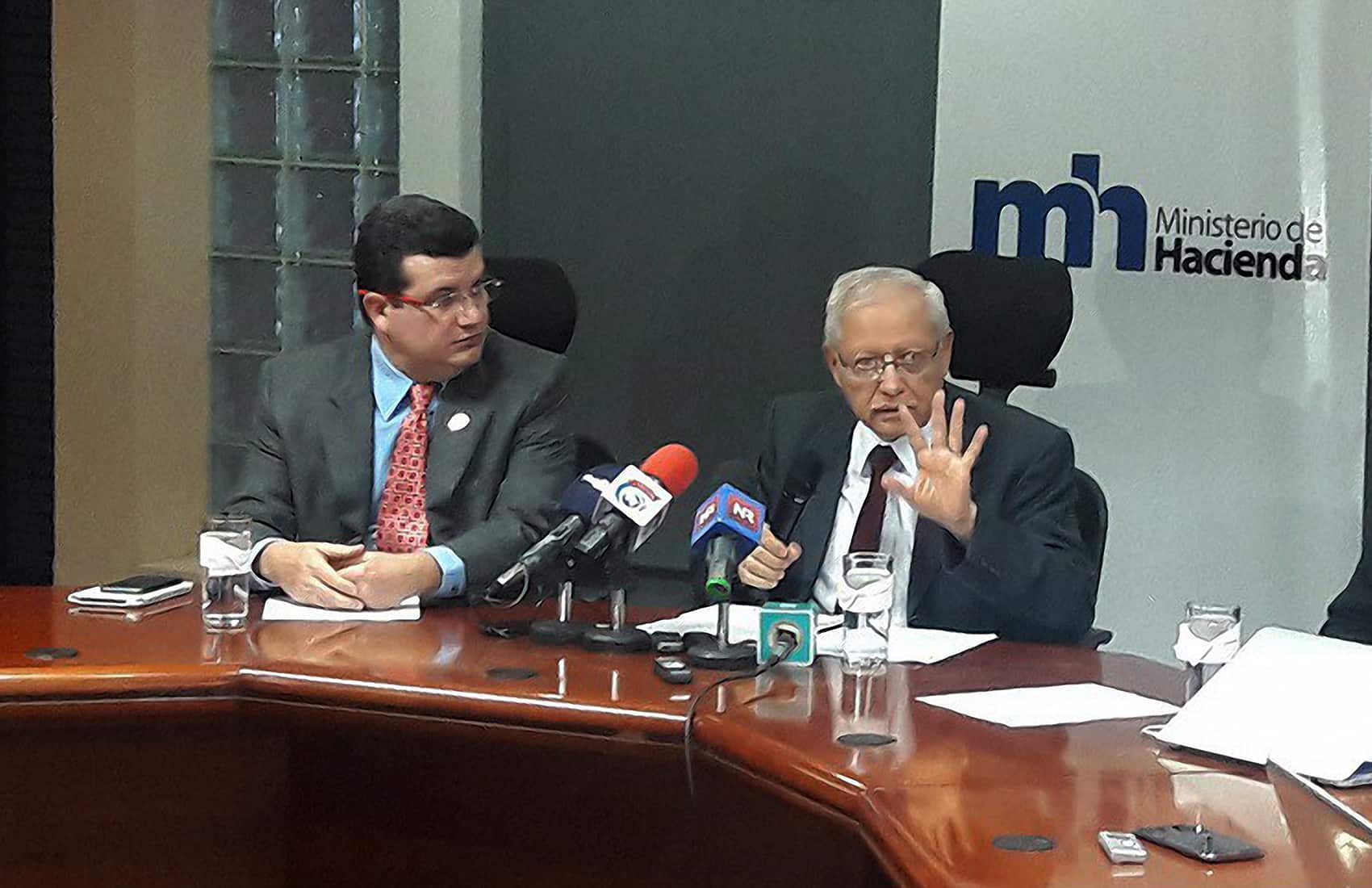President Luis Guillermo Solís will table a series of draft bills at the Legislative Assembly designed to increase government income and curb the country’s fiscal deficit, Casa Presidencial officials have announced.
Vice President and Finance Minister Helio Fallas and Presidency Minister Sergio Alfaro said at a press conference on Thursday that the Executive Branch will withdraw from the prioritary list of the Legislative Assembly four bills proposing tax reforms and measures to cut public sector spending.
“The four bills are at a stalemate. There is absolute no progress and therefore we will table them on Monday,” Alfaro said.
Fallas said that Finance Ministry officials on Friday sent the Legislative Assembly new drafts, mostly focused on modifications to the country’s Sales Tax and Income Tax.
President Luis Guillermo Solís denied that the decision to table the bills was prompted by fears of the calls for a national strike that public sector unions made for next month.
“We’re not bowing down before anyone here… The bills were not viable. That’s the only reason why we’re tabling them,” Solís told reporters at a public event on Friday.
Vice President Fallas said that the government’s goal is to reach consensus to move forward with new draft bills they will submit to the Legislative Assembly on Feb 2.
Urgent reforms
Proposals to approve tax and public spending reforms have been stranded in the Legislative Assembly for almost two years.
Delays on the approval of these reforms already had consequences for Costa Rica. Credit ratings agency Fitch Ratings earlier this month downgraded Costa Rica’s Long-Term currency bonds to ‘BB’ from ‘BB+’. The country’s outlooks also were revised to Stable from Negative.
The agency attributed the change to the country’s deteriorating debt dynamics “driven by large fiscal deficits and continued institutional gridlock preventing progress on reforms to correct fiscal imbalances.”
On Friday Fitch also downgraded Long-Term Issuer Default Ratings for six banks operating here. Four of them are state-owned banks: Banco Nacional de Costa Rica, Banco de Costa Rica, Banco Popular and Banco Internacional de Costa Rica. Two are private banks: BAC San José and Davivienda.
Fallas said that other ratings agencies and international organizations are scheduled to visit the country in the next two months to evaluate progress on the fiscal reforms.
“It would be very dangerous for the stability of our country to continue receiving lower ratings,” he said.
Unions call off strike
Among the bills the government tabled was one that aims to eliminate a series of extra-salary bonuses and benefits paid only to public-sector employees.
The decision prompted leaders of BUSSCO and Colectivo Sindical Patria Justa, two umbrella groups that bring together over 100 workers’ unions and groups, to call off a strike scheduled for Feb. 6.
Unions leaders at a press conference on Friday confirmed they agreed to call off the strike following the government’s decision to remove bill #19,506 from the Legislative Assembly’s agenda.
BUSSCO coordinator Gilberto Cascante said the decision was “a triumph for the working class,” but noted that “they will keep up the fight until all similar bills are finally withdrawn from the Assembly.”
The strike would have also affected classes at all public schools in the country, scheduled to begin that same day.
Private sector: Irresponsible decision
Leaders from private-sector chambers and groups lashed out after the government’s announcement and accused the administration of President Solís of having double standards.
The Costa Rican Union of Private-Sector Chambers and Associations (UCCAEP) on Friday called the government’s decision “irresponsible and incongruous.”
UCCAEP temporary President Víctor Ruiz said that the administration of President Solís, “from its very beginning, has minimized the importance of passing the fiscal reforms.”
Ruiz said that just over a year ago Vice President Fallas sent UCCAEP a letter saying that the country’s fiscal situation is critical and that it required urgent action.
“But now they contradict themselves, showing poor political management,” he said.
Opposition to the government’s fiscal plan also comes from lawmakers from all parties, even Solís’ Citizen Action Party.
A group of 22 legislators last year signed a public letter saying that they would not support any proposal to create or increase taxes until the government pledges to reduce public spending, particularly extra-salary bonuses and benefits.
Fiscal plan
President Solís’ initial plan included a series of reforms including turning the 13 percent Sales Tax into a Value-Added Tax (IVA) of 15 percent.
The plan also proposed increasing the number of products and services that would be taxed. Among others, it sought to collect taxes on tourism services, self-employed professionals, property rentals, gyms, and other services that currently are tax-exempt.
Another initiative proposed taxing private health and private education services with a special 4 percent IVA.
It would also have raised, by 1 percent, the Selective Consumption Tax charged on non-essential goods such as liquors, cigarettes and new vehicles, among others.
The plan’s goal was to collect ₡400 billion (some $713 million), equivalent to 2 percent of the country’s Gross Domestic Product (GDP).
The government now will aim at collecting some 0.6 percent of GDP, Fallas said.
“The key is to modernize the IVA and introduce new elements that will allow us face the challenges that the new digital economy generates,” he said.
The vice president called on Legislative Assembly President José Alberto Alfaro and top lawmakers from all parties to weigh in on the government’s new plan and submit feedback by next Thursday.






